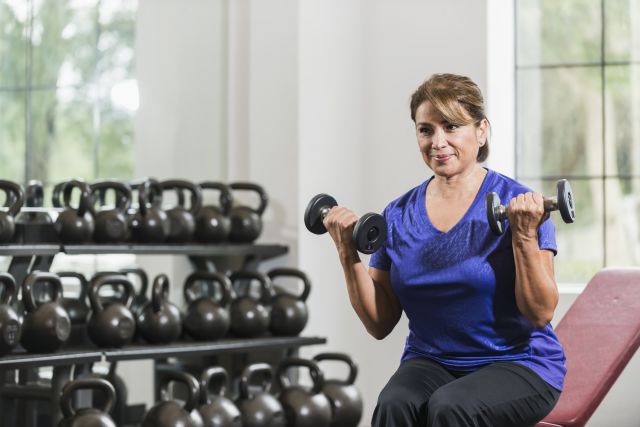Updated on May 18, 2023.
If you’re looking to develop and maintain muscle and increase strength, you might think that the only way is by lifting the heaviest weight possible. In fact, you can get stronger by pumping lighter. You just have to do it strategically.
A 2017 meta-analysis published in the Journal of Strength and Conditioning Research looked at 21 studies to see what happened to participants’ muscles when they lifted lighter weights with more repetitions (reps) compared to heavier weights with fewer reps. The researchers found that increases in strength and muscle building were similar for both types of training. Another meta-analysis, published in Applied Physiology, Nutrition, and Metabolism in 2022 came to the same conclusion.
Flex your muscle
If you prefer to use lighter weights, the key is to push yourself hard enough and do enough reps to reach the point of muscle fatigue. Another study published in the Journal of Strength and Conditioning Research in 2022 found that low loads lifted to muscle failure (the point at which you cannot lift the weight one more time with good form) increased muscle size, but low loads that were not lifted to failure didn’t give muscles that same boost in size.
Strength training that combines light weights and more reps is a great way to stimulate those muscle cells to build more tissue. That's all the more important as we get older, because our bodies tend to lose muscle with age.
According to the Physical Activity Guidelines for Americans, along with getting at least 150 minutes per week of moderate-intensity aerobic exercise, strength training should be done at least two days per week. When you do so, you’ll want to include all of the major muscle groups: the legs, hips, back, chest, abdomen, shoulders, and arms. Anywhere from one to three sets of an exercise that includes eight to 12 reps that take you to the point of muscle fatigue works well.
Exercises to build muscle
There are many exercises that can be effective with the low-load, high-repetition training design. Try these:
Build a strong lower body
Doing squats engages the full range of muscles in the legs, and you can add a challenge to them by holding light weights or pushing against resistance bands. Cooling down and stretching after squats is also important to help your muscles relax.
Work the upper body
For your upper body and arm strength, moves including pushups, triceps dips, overhead shoulder presses, triceps extensions, and triceps kickbacks can all be done with light weights or resistance bands and high reps.
Free weight or body weight movements aren’t the only options. If you have access to a gym, any strength exercise performed on a machine works well with this type of training. Examples include lat pulldowns to work the upper back and leg extensions to develop the quadriceps muscles in the thighs.
Be a lightweight
Even if you’re using relatively light weights, it’s important not to dive headlong into strength training if your body is not accustomed to it. That’s a formula for injury—which will set you back on your path to fitness.
No matter the exercise, make sure that you focus on good form over speed and that you engage your core properly to help avoid injury. Moves like squats are full-body moves, so it’s important to think about and feel how your legs, core, and upper body work together effectively when you’re doing the exercise. Some other exercise safety tips from the National Institutes of Health include:
Start slowly
Use light weights at first and increase them gradually.
Listen to your body
A little soreness after a workout is to be expected, but excessive exhaustion, sore joints, or persistent pain are signs that you are overdoing it. Ease back on your program to give yourself time to recover. Remember, getting in shape is a steady process that takes time. If you have to take a day off to recover, that will help your body in the long run.
Use your muscles, not momentum
Lift the weights smoothly and with control. Don’t jerk, thrust, or swing weights into position.
Check with a healthcare provider before you start a new strength-training program to make sure you are fit to start and for tips on how to work out safely and effectively.







